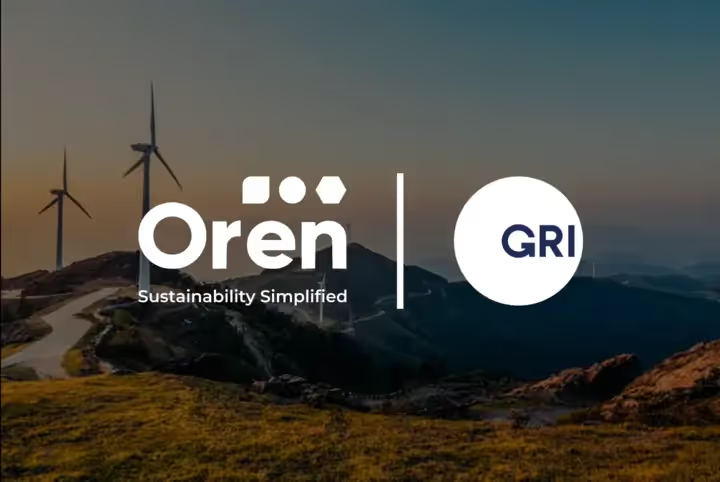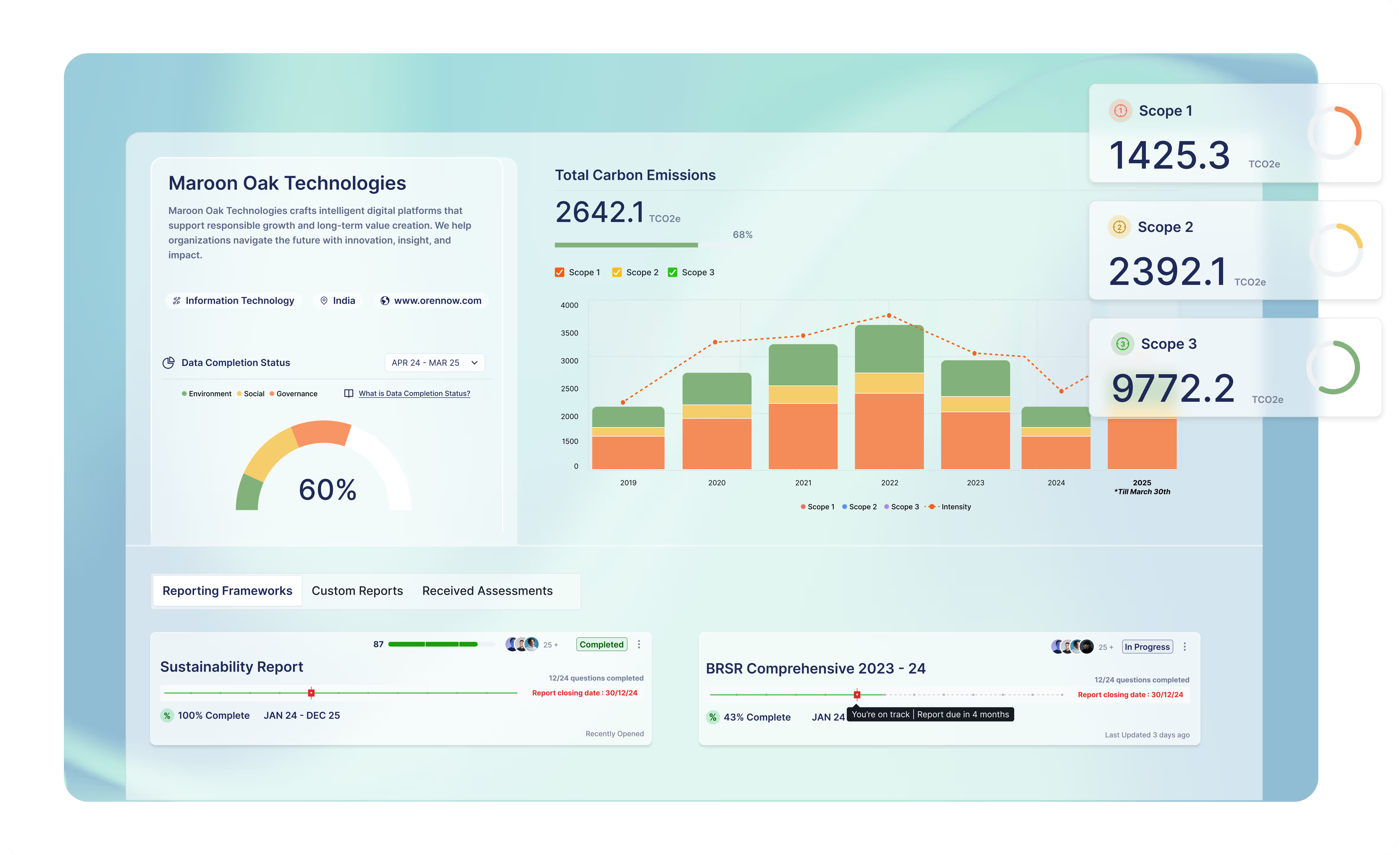
Scope 1, 2 & 3 Emissions Linking Data To Real World Action
Scope 1, 2, & 3 emissions explained for business with examples, key differences, carbon emissions reporting essentials, and a look at the future outlook for companies.
The Task Force on Climate-related Financial Disclosures (TCFD) framework provides companies with a structured, globally recognized approach to assess, manage, and disclose climate-related risks and opportunities through robust TCFD reporting. By integrating climate considerations into governance, strategy, risk management, and metrics, TCFD empowers organizations to build resilience, attract responsible investment, and strengthen stakeholder confidence.
Aligned with international best practices, TCFD sustainability reporting enables businesses to identify transition and physical risks, evaluate potential financial impacts, and communicate their preparedness in a clear, decision-useful format. Whether you're beginning your climate disclosure journey or enhancing your current reporting, TCFD reporting solutions help turn complex climate data into actionable insights that drive strategic decision-making and long-term value creation.
Build a climate-resilient business that thrives in a low-carbon future while reinforcing trust with investors, regulators, and stakeholders.

























Utilise our TCFD-aligned framework template within a scalable TCFD reporting platform to streamline climate disclosure and ensure efficient reporting
Automatically map climate-related data to the relevant TCFD recommendations and disclosures using intelligent TCFD software for accuracy and efficiency.
Enhance your TCFD report quality by benchmarking against peers to identify disclosure gaps and align with climate best practices.
Generate high-quality, credible TCFD reports that clearly communicate your climate strategy with investors and stakeholders through an integrated TCFD reporting solution.
Our TCFD reporting services help businesses disclose climate-related risks and opportunities in a transparent, consistent, and credible manner. We enable companies to build resilience, attract investors, and strengthen their sustainability profile while supporting alignment with IFRS 1 and 2 requirements where relevant.
Align your climate disclosures with TCFD guidelines and emerging IFRS 1 and 2 solution expectations for consistent and reliable reporting.
Leverage climate-related data to make strategic decisions that drive long-term value creation and effective risk mitigation across your organisation.
We guide you through the entire TCFD reporting process, from risk assessment to the development of clear and actionable disclosures that meet regulatory requirements and stakeholder expectations, supported by flexible TCFD software.
Identify and evaluate climate-related risks and opportunities across your operations and supply chain.
Develop structured, TCFD-compliant reports that effectively communicate your climate strategy and performance through a reliable TCFD reporting platform.


“Oren is very professional, and they deliver their services and commitments in a time-bound manner. The products they have developed are absolutely topnotch and it caters to all our requirements.”

“Oren's technology and expert advisory helped us overcome data management hurdles and navigate stakeholder engagement, materiality assessment and quantifying environmental impact to publish our first BRSR report.”


“Oren immensely helped us with our Scope 1 and Scope 2 reporting. Overall, the team is well updated and very supportive - and they were always just a call away. I definitely recommend Oren to anyone who is looking for assistance in their ESG journey.”

“Oren's expertise has been instrumental in driving our ESG achievements, consistently guiding us with professionalism, reliability, and timely execution. Their outstanding products not only surpassed expectations but also fully complied with Metrochem API Industries' ESG standards.”


“Oren is very professional, and they deliver their services and commitments in a time-bound manner. The products they have developed are absolutely topnotch and it caters to all our requirements.”

“Oren's technology and expert advisory helped us overcome data management hurdles and navigate stakeholder engagement, materiality assessment and quantifying environmental impact to publish our first BRSR report.”


“Oren immensely helped us with our Scope 1 and Scope 2 reporting. Overall, the team is well updated and very supportive - and they were always just a call away. I definitely recommend Oren to anyone who is looking for assistance in their ESG journey.”

“Oren's expertise has been instrumental in driving our ESG achievements, consistently guiding us with professionalism, reliability, and timely execution. Their outstanding products not only surpassed expectations but also fully complied with Metrochem API Industries' ESG standards.”
The Task Force on Climate-related Financial Disclosures (TCFD) is an organization established in 2015 by the Financial Stability Board (FSB) to develop recommendations for more effective climate-related disclosures. Its goal is to promote informed investment, credit, and insurance underwriting decisions by enhancing transparency on climate-related risks and opportunities.
The TCFD recommendations provide a framework for companies to disclose climate-related financial information. They are structured around four thematic areas: Governance: Disclose the organization’s governance around climate-related risks and opportunities. Strategy: Disclose the actual and potential impacts of climate-related risks and opportunities on the organization’s businesses, strategy, and financial planning. Risk Management: Disclose how the organization identifies, assesses, and manages climate-related risks. Metrics and Targets: Disclose the metrics and targets used to assess and manage relevant climate-related risks and opportunities.
The TCFD recommendations are applicable to organizations across sectors and jurisdictions. They are particularly relevant for companies with public debt or equity, as well as asset managers and owners. While adoption is voluntary, many organizations choose to implement the recommendations to enhance transparency and meet investor expectations.
Disclosure under the TCFD recommendations is currently voluntary. However, some countries are moving towards mandating such disclosures. For example, the UK government has announced plans to make TCFD-aligned disclosures mandatory for certain companies by 2025.
Implementing the TCFD recommendations can provide several benefits, including: Enhanced Transparency: Improved disclosure of climate-related risks and opportunities. Better Risk Management: Structured assessment and management of climate-related risks. Informed Decision-Making: Provision of decision-useful information to investors and stakeholders. Reputation Enhancement: Demonstration of commitment to sustainability and responsible business practices.
Organizations can begin by reviewing the TCFD recommendations and assessing their current disclosure practices against them. Engaging with stakeholders, conducting scenario analysis, and integrating climate-related considerations into governance and risk management processes are key steps. Utilizing resources such as the TCFD Knowledge Hub can provide additional guidance.
Yes, the TCFD emphasizes the importance of scenario analysis in assessing the potential impacts of climate-related risks and opportunities. It provides guidance to help organizations consider different climate-related scenarios, including a 2°C or lower scenario, to understand the resilience of their strategies under various potential future states.
Yes, the TCFD has developed supplemental guidance for specific sectors, particularly those with significant exposure to climate-related risks and opportunities. These sectors include energy, transportation, materials and buildings, and agriculture, food, and forest products. The supplemental guidance offers additional context and suggestions tailored to these industries.

Scope 1, 2, & 3 emissions explained for business with examples, key differences, carbon emissions reporting essentials, and a look at the future outlook for companies.

Selecting the right ESG framework is essential for organisations aiming to showcase their sustainability efforts and responsible business practices. This comprehensive guide breaks down the complexities of ESG frameworks, explains their significance, and highlights popular options like BRSR, GRI, SASB, TCFD, and CSRD. It covers key factors to consider, including materiality, stakeholder expectations, industry trends, and regulatory requirements. The blog also offers actionable steps for implementation, tips on using multiple frameworks, and insights on how ESG reporting drives long-term value creation.

The Global Reporting Initiative (GRI) Standards are a critical framework for sustainability reporting, widely used by organisations to communicate their economic, environmental, and social impacts. This blog explores the GRI’s importance, particularly in India, where ESG reporting is gaining prominence. It highlights how the GRI Standards help companies align with global guidelines like the UN SDGs and the OECD Guidelines. With Universal, Sector, and Topic Standards, the GRI framework offers a flexible yet comprehensive approach to sustainability reporting. Tools like Oren’s platform simplify ESG reporting, aiding businesses in meeting global standards and contributing to sustainability goals.
.webp)
A materiality assessment is a key tool for identifying and prioritizing the most relevant Environmental, Social, and Governance (ESG) issues that affect a company's operations and stakeholders. By focusing on significant issues, companies can align their sustainability strategies with stakeholder expectations, ensuring compliance with ESG reporting standards like GRI and BRSR. Conducting an effective assessment involves engaging both internal and external stakeholders, identifying critical ESG issues, prioritizing them through a matrix, and using the results to inform strategy. Materiality assessments enhance transparency, improve decision-making, and foster long-term sustainable growth.
